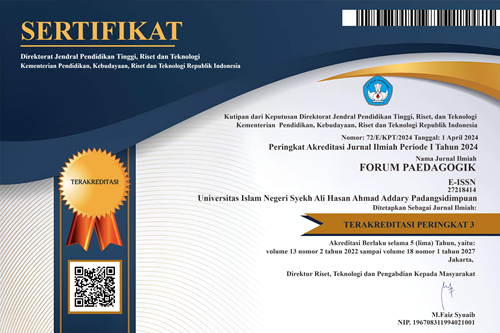PARADIGMA PENDIDIKAN BERBASIS AKHLAK TASAWUF
Abstract
Sufism moral-based education paradigm is shaped purely conceptual studies offer ideas who want to build a whole person. Competency-based curriculum and character-based curriculum emphasizes the concept that only a social reality that has its disadvantages. Character of education needs to be a deeper meaning and should be enriched by elements of corresponding to the frame of Islamic education, they are Sufism and morals. As national education, it serves to develop the ability and character development and civilization of dignity in the context of the intellectual life of the nation, it aims to develop the potential learners become religious, healthy, knowledgeable, capable, creative, independent, and become citizens of a democratic and responsible. Sufism morals-based education is offered to orient and focus the moral of Sufism based curriculum, hiring teachers that teacher candidates must pass examinations that support teacher competence, both in the field of social and human decency. Integration and interconnective learning become one of the most important thing because the moral foundation of knowledge of Sufism as an established religion. So privatization law and legality to be one way to realize the goal of national education at the government so that the supremacy of law achieves a healthy life and hereafter.
Keyword: Paradigm, Education and Sufism
Sufism moral-based education paradigm is shaped purely conceptual studies offer ideas who want to build a whole person. Competency-based curriculum and character-based curriculum emphasizes the concept that only a social reality that has its disadvantages. Character of education needs to be a deeper meaning and should be enriched by elements of corresponding to the frame of Islamic education, they are Sufism and morals. As national education, it serves to develop the ability and character development and civilization of dignity in the context of the intellectual life of the nation, it aims to develop the potential learners become religious, healthy, knowledgeable, capable, creative, independent, and become citizens of a democratic and responsible. Sufism morals-based education is offered to orient and focus the moral of Sufism based curriculum, hiring teachers that teacher candidates must pass examinations that support teacher competence, both in the field of social and human decency. Integration and interconnective learning become one of the most important thing because the moral foundation of knowledge of Sufism as an established religion. So privatization law and legality to be one way to realize the goal of national education at the government so that the supremacy of law achieves a healthy life and hereafter.
Keyword: Paradigm, Education and Sufism
- DAFTAR PUSTAKA
- Abuddin Nata, Manajemen Pendidikan; Mengatasi Kelemahan Pendidikan Islam di Indonesia, Jakarta: Kencana, 2003.
- Achmad Habibullah dkk. Inovasi Pembelajaran Pendidikan Agama Islam (SMA), Jakarta: Diklat Kemenag RI, 2010.
- Ali M. dan Luluk Y.R. Paradigma Pendidikan Universal di Era Modern dan Post Modern; Mencari Visi Baru atas Realitas Baru Pendidikan Kita, Bandung: Remaja Rosdakarya, 2004.
- Ary Ginanjar Agustian, ESQ Emotional Spritual Question, Jakarta: Agra Publishing, 2009.
- Baharuddin. Aktualisasi Psikologi Islam, Yogyakarta: Pustaka Pelajar, 2005.
- Fuad Nashori, Agenda Psikologi Islam, Yogyakarta: Pustaka Pelajar, 2002.
- Gunawan, Kebikajan-Kebijakan Pendidikan di Indonesia, Jakarta: Bina Aksara, 1996.
- Hasbullah. Pengantar Ilmu Pendidikan Islam, Bandung: Rosdakarya, 2007.
- Hasim Muhammad, Dialog Antara Tasawuf dan Psikologi, Yogyakarta: Pustaka Pelajar, 2002.
- Indra Djati, Menuju Masyarakat Belajar, Menggagas Paradigma Baru Pendidikan, Ciputat: Logos Wacana Ilmu, 2001.
- KPU, Undang-Undang Dasar 1954 disertai Susunan Kabinet Indonesia Bersatu II, Jakarta: Sandro Jaya, 2013.
- M. Yatimin Abdullah, Studi Akhlak dalam Perspektif Qur’an, Jakarta: Amzah, 2007.
- Armyn Hasibuan.......Paradigma Pendidikan 119
- Okezone, Pendidikan, www.okezone.com.
- Syafaruddin Q. Mesiono, ed. Pendidikan Bermutu Unggul; Visi Pendidikan Menuju Tahun 2020 dalam Kontek Otonomi Daerah, Bandung: Cita Pustaka Media, 2006.
- Thomas Khun, Pancasila Sebagai Paradigma Pembangunan, www.exalute.wordpress.com.
 Copyright (c) 2015 Armyn Hasibuan
Copyright (c) 2015 Armyn Hasibuan

This work is licensed under a Creative Commons Attribution-ShareAlike 4.0 International License.











